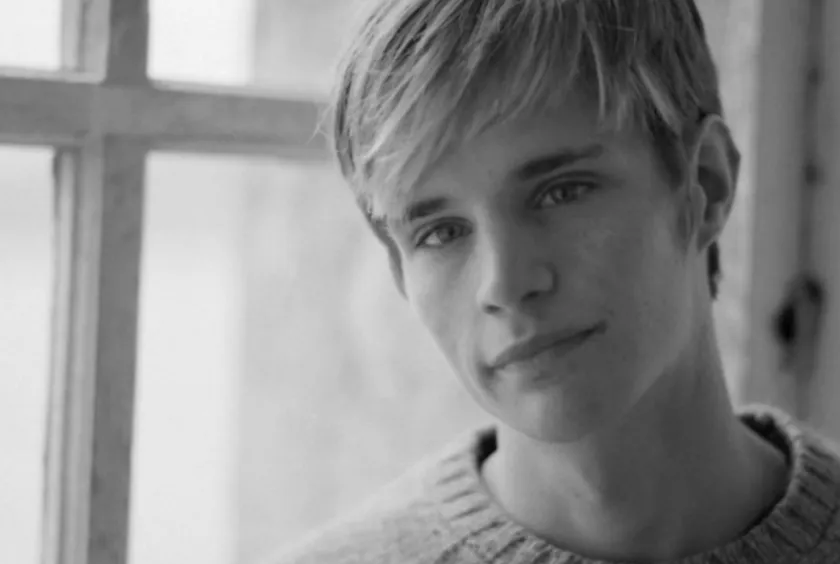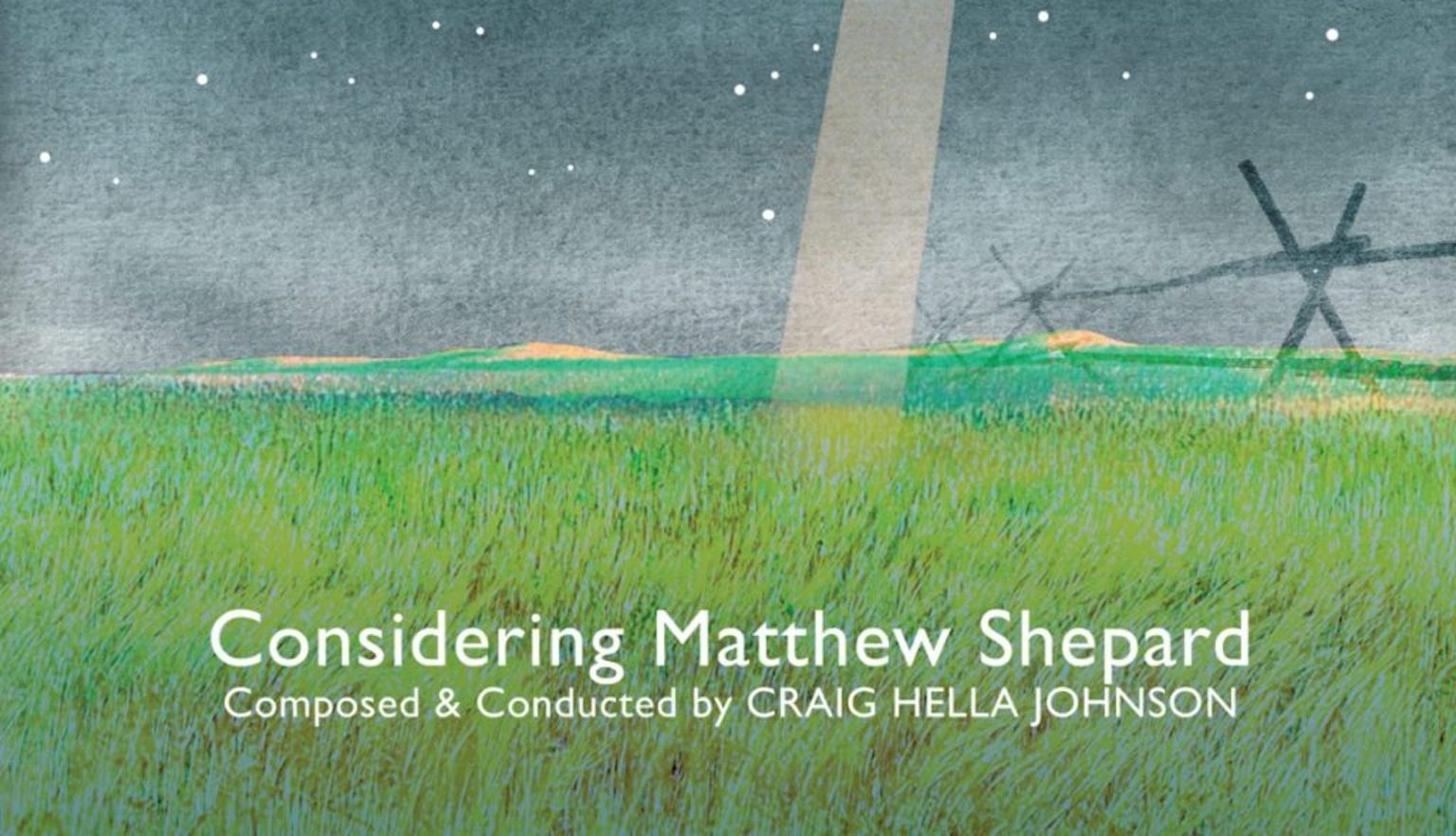Northern Michigan University's choral ensembles will perform a demanding piece—both musically and emotionally—that pays homage to a Wyoming college student whose violent death in 1998 made national headlines and played a key role in the later expansion of federal hate-crime legislation. Most of the NMU singers were not born when Matthew Shepard was lured from a bar by two men, tied to a split-rail fence and beaten unconscious because of his sexual orientation. But they are fully invested in doing justice to his story and its broader messages.
Considering Matthew Shepard is a 90-minute oratorio that blends diverse musical styles with lyrics drawn from police and news reports, responsive poetry, comments from Shepard's parents and his personal journal. The free performance is scheduled for 7:30 p.m. Tuesday, Feb. 21, in Reynolds Recital Hall. It will be performed without an intermission, with applause held until the end. Parental discretion is advised.
Composer Craig Hella Johnson is the Grammy-winning founder and artistic director of Conspirare, a virtuoso choir based in Austin, Texas, which premiered Considering Matthew Shepard in 2016. The piece was released for public purchase three years later. NMU Director of Choirs Erin Colwitz admits that it is a highly ambitious undertaking usually reserved for professional ensembles or elite collegiate choirs. She said the University of Michigan is the only other state school that has performed the work.
“I'm very proud of my students; they are taking it very seriously,” Colwitz said. “They became aware of this piece and were hungry to do it. I was initially worried about how they would respond to the heavy material, but this younger generation is more willing and open to tackle these subjects, and they've done it with the utmost maturity. We've had deep discussions in rehearsals—about generalizations, for example, such as not assuming all Christians hate gay people or that gay people aren't Christians—and the need to condition ourselves not to go to a dark place. It's been an interesting learning experience.”
Jaymes Winn, a senior music/secondary education from Marquette, said she had never heard of Shepard until the choirs performed a movement from the piece as part of a previous concert. She will sing some lines attributed to his mother, Judy.
“Getting to know who Matthew was and what his story came to be has been emotionally taxing and incredibly eye-opening for me,” Winn said. “The content weighs on me, and it's difficult to ponder on for long. However, this work professes love and kindness in the face of hate and violence, and I feel privileged to be able to perform it with such skilled musicians, since it allows us to share that message of hope and light with our community. Judy was simply the mother of a wonderful child who showed love and positivity. I can only imagine the grief that would accompany the loss of a child in such a horrific way, and the resolve she must've had to become an advocate for LGBT+ rights and equality.”
Colwitz said there will be some heart-wrenching moments during the performance likely to make some people cry, but it ends on a high note and brings the audience to a place of hope for the future.
“It presents the idea that all of us can meet at the fencepost, acknowledge that something bad happened, move forward to the horizon and work together as a human race and try to become better people,” she added. “It's also very relatable—how we're all just trying to get through this crazy, hard life, and how that would be much easier if everyone approached it with love, acceptance and compassion. There's also the love for family and the grief associated with loss that most of us have experienced. This relatability is reflected in a movement at the end titled ‘All of Us.'”
The lyrics of “All of Us” include the following segment: “Out of heaven, rain; rain to wash us free. Rivers flowing on, ever to the sea. Bind up ev-'ry wound, ev-'ry cause to grieve; always to forgive, only to believe. Most noble Light, Creation's face, how should we live but joined in You? Remain within Your saving grace through all we say and do. And know we are the Love that moves the sun and all the stars? O Love that dwells, O Love that burns in every human heart. Only in the Love, Love that lifts us up!”
Relatability is also expressed in a prologue movement about “an ordinary boy living ordinary days in an ordinary life so worth living. He felt ordinary yearning and ordinary fears with an ordinary hope for belonging.” It includes text from Shepard and his mother.
Other movements in Considering Matthew Shepard are written from varying perspectives: the fence he was bound to for 18 hours, barely clinging to life before he was discovered and transported to a hospital, where he died five days later; the large doe a sheriff's deputy spotted lying near him, as if she had kept him company all through the night; and one of the Westboro Baptist Church members who protested Shepard's funeral, carrying signs such as “God hates fags.”
Even the two men convicted of his murder are referenced in “I Am Like You/We Are All Sons,” which addresses the hate humans are capable of directing at those viewed as different and how audiences might weigh their own culpability and imperfections.
“This is a really impressive piece of music that incorporates many different musical styles,” Colwitz said. “The composer is a classical pianist who studied at St. Olaf College, which sets the standard for choral excellence. It opens with Bach's ‘Prelude in C Minor' and there's classical chorale, gospel, blues, country and Southern hymns. There are also a lot of solo opportunities for my students to showcase their skills. This really belongs alongside Bach—it's that good. They are two monumental works: one classic, one modern, but both relevant.”
One of the soloists is Harrison Bouche, a senior communications studies major. He said this is by far the longest piece he has sung through, and likely ever will, as a member of the NMU Arts Chorale.
"Some of the music is written in a country style, and that includes my solos," Bouche said. "At first I found it a little frightening, as someone who doesn't listen to any country music, but I am taking notes from my fellow singers who do. In the end, the most important part to me is being respectful to the music, as it represents facets of Matthew's life, and I want to ensure that his story is told properly. It wasn't until we dove into the full work that I fully comprehended the impact his death has had on our acceptance and visibility of the queer community in contemporary culture."
Colwitz applied funds from the NMU Music Department's Craig Endowment, which is designated for choral music, to secure the rights to the piece, purchase scores and hire some of the musicians who will accompany the four-part chorus.
Shepard's ashes were not buried until 2018, when he became the first person since Helen Keller to be interred at the Washington National Cathedral. His parents were concerned that his grave site would be desecrated. “Matthew loved the church,” said his father, Dennis, at the remembrance ceremony. “He loved the fact that it was a safe place for anyone who wanted to enter."


